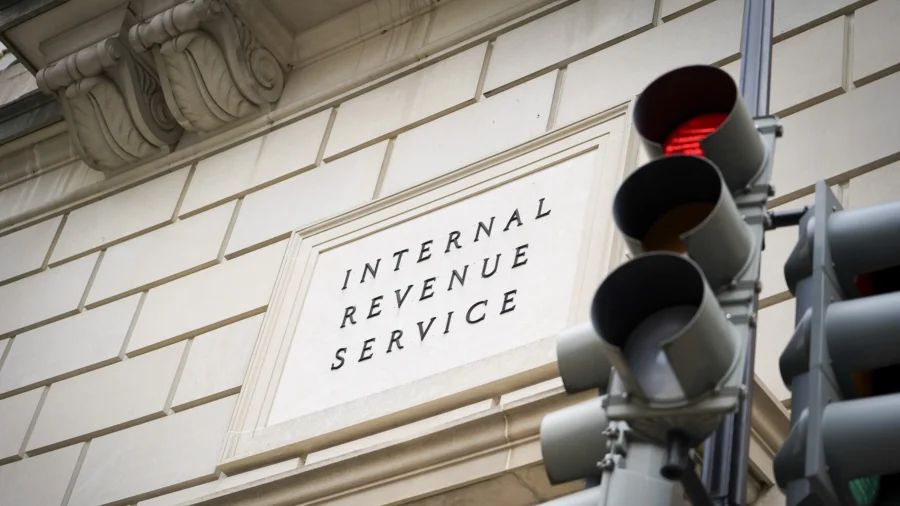A watchdog overseeing the IRS has revealed that the agency is hiring 5,582 tax enforcers this year, although it dismissed as “unfounded” media reports claiming the tax agency is hiring “87,000-armed enforcement agents” because only a fraction of the new hires will carry guns.
The Treasury Inspector General for Tax Administration (TIGTA), which is the watchdog overseeing the IRS, disclosed the agency’s hiring plans for 2024 in an April 3 report on how the IRS is spending its $78 billion funding boost.
The IRS got roughly $79.4 billion in supplemental funding when President Joe Biden signed the Inflation Reduction Act of 2022 into law, though Congress later clawed back around $1.4 billion.
Still, even with the clawback, the massive cash infusion represented a roughly 600-percent increase over the IRS’ prior year budget.
Republicans warned at the time that the money would be used to hire an “army of 87,000” tax enforcers who would come down hard on ordinary Americans and squeeze them for “every last penny.”
As claims of the “army of 87,000” enforcers captured the spotlight, the IRS went to great pains to push back on this notion. Various Biden administration officials insisted audits wouldn’t rise for Americans making less than $400,000 per year, even though the very same watchdog—TIGTA—warned that this promise could be hard to keep because the IRS uses outdated income thresholds and has “no way to identify the complete population of taxpayers that meet the criterion of $400,000.”
In its latest report, the watchdog weighed in on the 87,000 tax enforcement army, while noting that its Office of Audit is currently assessing the IRS’s hiring practices.
“There has been widespread reporting that the IRS will be hiring 87,000-armed enforcement agents,” the watchdog wrote in the report, adding that “this claim is unfounded.”
“The only enforcement personnel employed by the IRS who are armed are Criminal Investigation Division special agents,” TIGTA added, noting also that special agents have the lowest number of staff of all the IRS’s enforcement personnel.
The IRS Criminal Investigation (IRS-CI) division examines potential criminal activity related to tax crimes, with its special agents authorized to carry guns and use lethal force.
IRS Enforcement Hiring Plans
The watchdog’s report reveals that the IRS is on track to hire a total of 5,582 tax enforcers across three staffing categories—revenue officers, revenue agents, and special agents.
The 2024 hiring target for revenue officers—staff in the IRS’s “collection” function who collect delinquent taxes and secure delinquent returns—is 517. This will bring the total by the end of the current fiscal year, which ends on the last day of September, to 3,470.
The bulk of the new hiring will be revenue agents, who are employees in the “examination” function that carry out face-to-face tax audits of more complex returns. The IRS plans to hire 4,663 revenue agents in the 2024 fiscal year, which will bring their numbers up to 12,358.
The smallest number of new hires is armed special agents in the criminal division. The IRS plans to hire 402 of them this year, bringing the total by the end of the current fiscal year to 2,500.
Overall, the IRS is on track to bring its tax enforcer total to 18,328 staff members, per the watchdog report.
The IRS’ total staffing levels at the end of fiscal 2023 stood at 89,767, an increase of roughly 10,700 compared to the prior year.
The tax agency plans to increase this to 105,188 by the end of fiscal year 2025, the watchdog said, adding that all of the increased staffing levels are thanks to the supplemental funding boost.
As of Dec. 31, 2023, the IRS spent around $1.8 billion of the new funding on labor costs.
Republicans have questioned the IRS’s focus on boosting enforcement activities.
During a Senate Finance Committee hearing in April last year, Sen. John Thune (R-S.D.) pointed out that more than half of what was then nearly $80 billion in new funding was earmarked for enforcement activities.
While admitting that some additional enforcement may be necessary at the agency, Mr. Thune noted that the heavy focus on ramping up hiring in the section seemed disproportionate.
‘Sweeping, Historic’ Enforcement Crackdown
In September 2023, the IRS announced a “sea change” in every aspect of its operations—including a “sweeping, historic” tax enforcement crackdown to increase tax collections.
The big changes are driven in part by cutting-edge technologies, including artificial intelligence, which is meant to help IRS compliance teams better detect “tax cheats” and identify tax compliance loopholes to maximize the amount of money the agency collects from taxpayers.
According to IRS estimates, taxpayers in America pay around 85 percent of the total taxes they owe, with the difference between what is owed and what is paid known as the tax gap.
Between the years 2014 and 2016, the IRS estimated that the annual tax gap was around $496 billion.
The overall goal of the IRS’s enhanced tax enforcement activities is to narrow the tax gap, with certain groups of taxpayers facing the brunt of these efforts.
The IRS has said it would prioritize its enforcement actions on taxpayers with total positive income above $1 million and who have over $250,000 in recognized tax debt.
The agency said it had dedicated dozens of agents to this taxpayer category in fiscal year 2024, saying it planned to contact roughly 1,600 such taxpayers who owe hundreds of millions of dollars in taxes.
Another enforcement thrust relates to the IRS Large Business & International Division’s (LB&I) Large Corporate Compliance (LCC) arm, which is being expanded and will be auditing an additional 60 big corporations with assets worth over $24 billion on average.
Still another enforcement drive involves cracking down on abuse of a corporate tax break that was repealed several years ago, while the fourth initiative targets individual taxpayers who make over $1 million in annual income and have over $250,000 in recognized tax debts.

